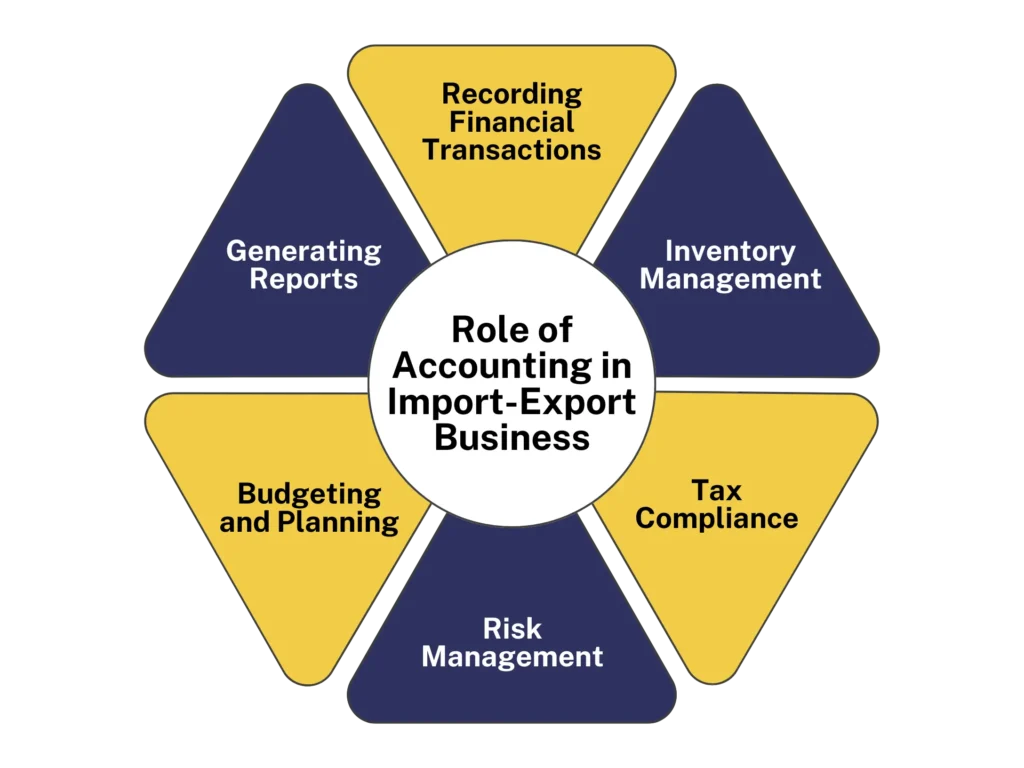
Introduction to Accounting for Import-Export Business
Import-export businesses must maintain constant awareness of various international regulations. However, the significance of import-export accounting cannot be neglected in ensuring financial compliance and enabling business expansion. Accounting plays a crucial role in tax relief, financial optimization, and pivotal decision-making.
Accounting for import-export experiences has a distinct nature as compared to other businesses due to the unique nature of their operations. Thus, a tailored approach is important to streamline accounting processes effectively. This guide aims to explain the pivotal role of accounting within the import-export business.
Role of Accounting for Import-Export Business
The role of accounting for import-export businesses is important for several reasons. It ensures compliance with international regulations, which are essential for smooth operations. Additionally, import-export accounting enables the accurate recording and management of financial transactions, which is crucial for maintaining transparency and accountability.
Moreover, effective import-export accounting provides valuable insights into the financial health and performance of the business. By analyzing financial data, businesses can identify areas for improvement, make informed decisions, and strategically plan for future growth.

Here we discuss the operations of accounting for import export business that are managed by an Accountancy Firm to help in growing your business financials.
recording Financial transactions
Import-export businesses encompass a wide array of transactions, including purchases, sales, shipping costs, customs duties, and currency exchanges. Proper accounting is essential to accurately record, categorize, and track these transactions, ensuring financial integrity and facilitating informed decision-making.
Generating financial reports
Accounting processes generate various financial statements, including income statements, balance sheets, and cash flow statements. These comprehensive reports serve as invaluable tools, offering deep insights into the financial landscape of the business. By shedding light on aspects such as profitability, liquidity, and overall performance, these statements empower stakeholders to make informed decisions and strategically steer the organization toward its goals.
Proper inventory management
Accounting for Import-Export Business systems plays a crucial role in monitoring inventory levels, tracking costs, and managing the movement of goods. This comprehensive oversight enables businesses to efficiently manage their inventory, reduce the risk of stockouts, lower carrying costs, and optimize order quantities. Through accurate tracking and analysis facilitated by accounting systems, organizations can streamline their operations and enhance overall efficiency in inventory management.
Budgeting and Planning
Accounting serves as a cornerstone for budgeting and forecasting within import-export businesses. By meticulously analyzing historical financial data and projecting future expenses, revenues, and cash flows, accounting enables organizations to chart realistic goals, allocate resources judiciously, and make informed decisions. This strategic planning not only enhances operational efficiency but also facilitates the attainment of long-term objectives in a dynamic global market landscape.
Tax Compliance
Import-export businesses are sensitive to a multitude of taxes, ranging from customs duties and value-added tax (VAT) to income tax. In this complex tax environment, import-export accounting plays a pivotal role in ensuring compliance with tax regulations, facilitating the timely filing of tax returns, and accurately calculating tax liabilities. By adhering to stringent accounting practices, businesses can mitigate the risk of penalties and legal ramifications, thus safeguarding their financial stability and operational continuity in the global marketplace.
Better cost analysis
Accounting offers valuable insights into the complexities of importing and exporting goods, including procurement costs, transportation expenses, customs duties, and taxes. Through meticulous cost analysis, businesses can identify opportunities for cost reduction, enhance profitability, and establish competitive pricing strategies.
This comprehensive understanding of costs aids in the accurate determination of proper costing, enabling import-export enterprises to navigate the global market landscape with confidence and efficiency.
Risk management
Accounting helps in identifying and effectively managing financial risks inherent in import-export operations, including credit risks, currency risks, and market risks. Through detailed analysis of financial data and performance metrics, businesses can proactively mitigate potential risks and make informed decisions to protect their financials.
This Strategic approach not only enables financial stability but also empowers import-export enterprises to navigate uncertain market conditions with confidence and resilience.
Final Words
These are some of the important roles played by accounting for import export business. Effective accounting practices can efficiently oversee financial management, ensure regulatory compliance, and enhance the optimization of international trade operations.
If managing import-export accounting is challenging for your business, consider outsourcing this task to Accounting specialists. Cridix Accountancy specializes in offering Premium Accounting Services tailored for import and export businesses. With extensive experience serving numerous import-export businesses, our team adeptly handles accounting tasks with precision and expertise. Cridix Accountancy stands out as a leading provider of accounting services specifically for import and export experiences.







